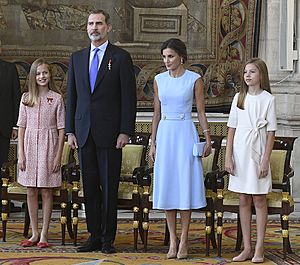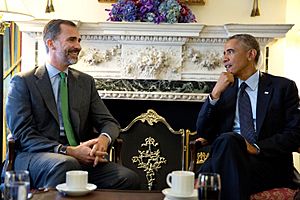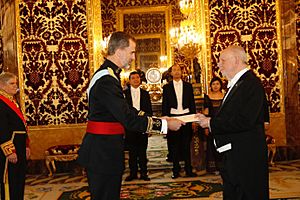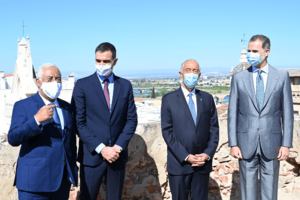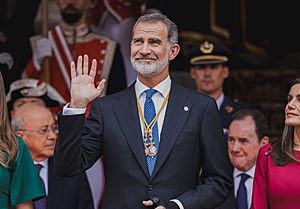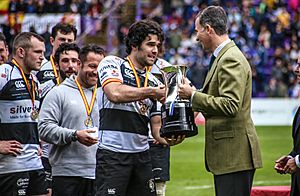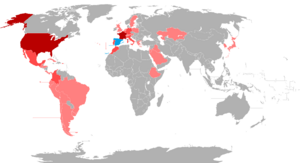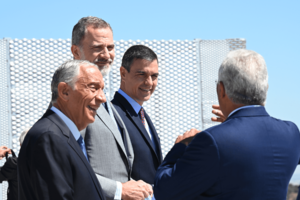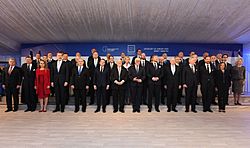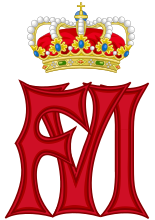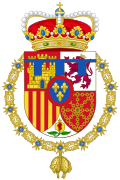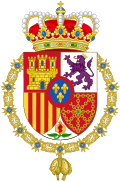Felipe VI facts for kids
Quick facts for kids Felipe VI |
|||||
|---|---|---|---|---|---|
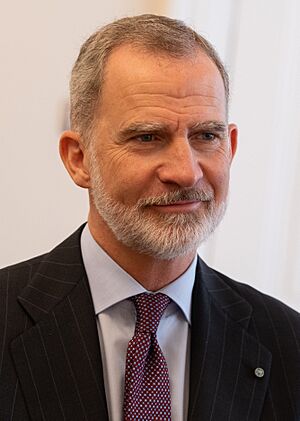
Felipe VI in 2024
|
|||||
| King of Spain (more...) | |||||
| Reign | 19 June 2014 – present | ||||
| Enthronement | 19 June 2014 | ||||
| Predecessor | Juan Carlos I | ||||
| Heir presumptive | Leonor, Princess of Asturias | ||||
| Born | 30 January 1968 Madrid, Spain |
||||
| Spouse | |||||
| Issue | |||||
|
|||||
| House | Bourbon | ||||
| Father | Juan Carlos I | ||||
| Mother | Sophia of Greece and Denmark | ||||
| Signature |  |
||||
Felipe VI (born 30 January 1968) is the current King of Spain. As king, he is the head of state for Spain. He is also the commander-in-chief of the Spanish Armed Forces. This means he is the top leader of the Army, Navy, and Air Force. He also represents Spain in important international meetings.
Felipe was born in Madrid when Francisco Franco was in charge of Spain. He is the third child and only son of Prince Juan Carlos of Spain and Princess Sophia of Greece and Denmark. In 1977, he was officially named Prince of Asturias. This is the special title for the person who will become king. He was also made an honorary soldier when he was nine years old.
Felipe went to Santa María de los Rosales School and Lakefield College School in Canada. He later studied law at the Autonomous University of Madrid. He also earned a special degree in Foreign Service from Georgetown University in Washington, D.C.
To get ready for his role as commander-in-chief, Felipe joined the Spanish Army in 1985. He also trained with the Navy and Air Force. After finishing his studies and military training, he started doing official duties. He represented his father at many events, like leading charity groups. At one event, he met TV journalist Letizia Ortiz Rocasolano. They got married in 2004. They have two daughters, Leonor and Sofía.
Felipe became king on 19 June 2014. This happened after his father, Juan Carlos I, decided to step down. His time as king has included important events. These include his strong words about the 2017 Catalan independence referendum and the COVID-19 pandemic. He has also worked to make the royal family more open and clear about its activities. Many people in Spain have a good opinion of him.
Contents
Early Life and Family
Felipe was born on 30 January 1968, in Madrid. He was the third child and only son of Prince Juan Carlos of Spain and Princess Sophia of Greece and Denmark. He was baptized on 8 February 1968. His full baptismal name is Felipe Juan Pablo Alfonso de Todos los Santos. This name includes names of past Spanish kings and his grandfathers.
His godparents were his paternal grandfather, the Count of Barcelona, and his paternal great-grandmother, Queen Victoria Eugenie.
Felipe was called infante after he was born. This is a title for a royal child. When Felipe was almost eight, Francisco Franco died. Felipe's father then became king. Felipe made his first public appearance at his father's ceremony on 22 November 1975.
Prince of Asturias
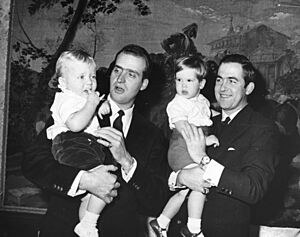
In 1977, Felipe was officially named Prince of Asturias. This is the title for the heir to the Spanish throne. In May, when he was nine, Felipe became an honorary soldier. This was for the 1st King's Inmemorial Infantry Regiment. The king and other important people attended the ceremony. On 1 November that year, he was honored as Prince of Asturias in Covadonga.
In 1981, Felipe received the Collar of the Order of the Golden Fleece from his father. On his 18th birthday, 30 January 1986, Felipe swore loyalty to the Constitution. He also swore loyalty to the King in the Spanish Parliament. This meant he fully accepted his role as the future king.
A new royal home was built for Felipe starting in 1999. It was called the Prince's Pavilion. Felipe moved into this home in the summer of 2002.
Education and Military Training
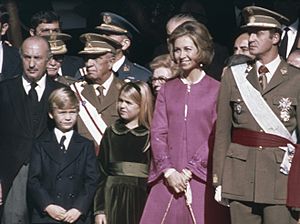
Felipe went to Santa María de los Rosales school. His daughters also went there. He attended high school at Lakefield College School in Canada. He then studied law at the Autonomous University of Madrid. He also took economics courses. He finished his studies with a Master of Science degree from Georgetown University in Washington, D.C. His cousin, Crown Prince Pavlos of Greece, was his roommate there.
As the future king, Felipe had a special plan for his military training. In August 1985, he was named an officer at the General Military Academy in Zaragoza. He started his training there in September. He finished the first part of his training in October. In July 1986, he was promoted to Cadet Ensign. He was also named a Midshipman.
In September 1986, he began naval training at the Naval Military Academy in Marin. In January 1987, he continued his naval training on the ship Juan Sebastián Elcano.
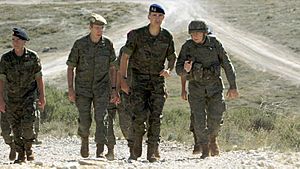
In July 1987, he was named a Student Ensign at the General Air Academy in Murcia. He started his air force training there in September. He learned to fly aircraft. In 1989, he was promoted to lieutenant in the Army, ensign in the Navy, and lieutenant in the Air Force. He became a captain in the Air Force in 1992. In 1993, he was promoted to lieutenant in the Navy and captain in the Army.
He received more promotions in 2000 and 2009. Since 19 June 2014, when he became king, he holds the highest military rank. This is Captain General of all Spanish armies. This includes the Army, Navy, and Air Force. In 2016, he received a special command baton. This symbolizes the loyalty of the armies to the king.
Felipe speaks Spanish, Catalan, French, English, and some Greek.
Participation in the Olympics
Felipe was part of the Spanish Olympic sailing team in 1992. The 1992 Summer Olympics were held in Barcelona that year. Felipe carried the Spanish team's flag at the opening ceremony. His team finished sixth in the Soling sailing class. He is an honorary member of the International Soling Association.
His mother and uncle, King Constantine II of Greece, were also on the Greek sailing team in 1960. Felipe's father and sister were also Olympic sailors for Spain.
Marriage and Children
Felipe's single life was often talked about in the Spanish news. He was linked to a few women. On 31 October 2003, it was announced that he was dating Letizia Ortiz Rocasolano. She was a television journalist who had been married before. The next day, the Royal Household officially announced their engagement. They met in late 2002.
The wedding took place on 22 May 2004, at the Almudena Cathedral. Many royal families and leaders from around the world attended. More than 25 million people in Spain watched the wedding on TV. This made it the most watched TV event in Spanish history.
Felipe and Letizia have two daughters. They are Leonor, Princess of Asturias (born 31 October 2005) and Infanta Sofía (born 29 April 2007). Both were born in Madrid.
Activities in Spain and Abroad
Felipe carried out his duties as the heir to the throne. He hosted many official events in Spain. He also took part in events across different areas of Spanish public life. Since October 1995, Felipe has visited many Spanish regions. He regularly met with government bodies to stay updated. He also met with young people who were successful in different fields. As part of his military training, Felipe learned to fly helicopters. When his father, King Juan Carlos I, could not attend, Felipe led military ceremonies.

Since January 1996, Felipe has represented Spain at many Latin American presidents' inauguration ceremonies. As Prince, he visited almost every country in Latin America. He made over 200 foreign trips in total.
Felipe has also worked to promote Spain's economy, trade, and culture abroad. He often represents Spain at global economic events. He is especially interested in promoting the study of Spain at major foreign universities.
After the 2004 Madrid train bombings in March 2004, Felipe joined a public demonstration. His sisters, Elena and Cristina, also took part.
Social Activities
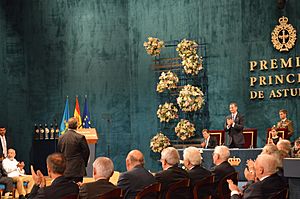
Felipe is the honorary president of several groups and foundations. One important one is the Codespa Foundation. This group helps with economic and social development in Latin America and other countries. He also leads the Spanish branch of the Association of European Journalists.
Most notably, he leads the Prince of Asturias Foundation. He presides over the annual awards ceremony for the very respected Princess of Asturias Awards. These awards were formerly called the Prince of Asturias Awards.
In 2001, UN Secretary General Kofi Annan named Felipe a "UN-Eminent Person." This was during the International Year of Volunteers. He continues to help promote the importance of volunteer work around the world.
Felipe is a member of the Sons of the American Revolution. This is because of his ancestor Charles III of Spain.
Reign
Becoming King
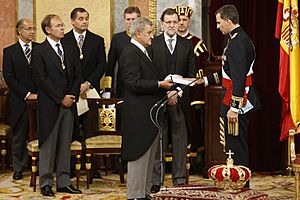
On 2 June 2014, King Juan Carlos announced he would step down. He wanted Felipe to become king. The Spanish government then started working on a law for this to happen. This law needed to be approved by the main house of Parliament. Felipe was expected to become king around 18 June.
Felipe became king at midnight on 19 June. His father had just signed the law allowing him to step down. The next morning, Felipe received the Captain General's sash from his father. This showed the transfer of royal and military power. He then officially swore an oath and was proclaimed king in a simple ceremony. He promised to uphold the Constitution. When he became king, he was the youngest monarch in Europe.
As king, Felipe has many powers on paper. He is the protector of the Constitution. He makes sure it is followed. He was expected to act mostly as a symbol, following the government's advice. He said in a speech that he would be "a loyal head of state who is ready to listen and understand." He also said he would "defend the public interest at all times." While he is the head of the country, he is not directly responsible for political decisions. His actions need to be approved by a minister.
A poll showed that many Spaniards wanted Felipe to play a bigger role in politics. They wanted him to help political parties agree on national problems. Another poll showed Felipe had more support than his father before he became king.
On 23 June 2014, he appointed Jaime Alfonsín as his Private Secretary. Two days later, he also appointed José Manuel de Zuleta y Alejandro as Private Secretary to the Queen.
On 18 July, the new king led his first meeting of the Council of Ministers.
Royal Family Changes
When he became king, Felipe promised a "renewed monarchy for a new time." A few days later, Felipe and Letizia were the first Spanish monarchs to meet with and recognize LGBT groups at the Palace. Felipe also changed rules to allow people to take an oath without a crucifix or Bible. This did not change his relationship with the Catholic Church. In fact, on their first trip abroad as king and queen, Felipe VI and Letizia met Pope Francis in June 2014.
The king also made a difference between the royal family and the King's family. His sisters and their children are not part of the main royal family. This means they do not officially represent the Crown. In July 2014, the king stopped royal family members from working outside the Royal Household. He also started external checks on the royal finances.
Since 1 January 2015, the Spanish royal family cannot accept "expensive gifts." In February 2015, Felipe announced he would cut his own yearly salary by 20%. This was because of economic problems in Spain.
In June 2015, Felipe VI removed his sister, Infanta Cristina, from her royal title. This happened after questions about her and her husband's finances. Her husband was later sent to prison.
In 2017, the royal family opened the gardens of their vacation palace, the Marivent Palace, to the public. People can visit the gardens when the royal family is not there.
In February 2024, the king appointed a new Private Secretary, Camilo Villarino. Villarino replaced Jaime Alfonsín, who had been Felipe's secretary for almost 30 years. Alfonsin stayed on as a private advisor. In April 2024, the king also appointed a new private secretary to the Queen, María Dolores Ocaña Madrid. By the end of 2024, the king had updated other top positions in his Household. He appointed Mercedes Araújo Díaz de Terán as Secretary-General and Carmen Castiella Ruiz de Velasco as Diplomatic Counselor.
2020 Royal Finances Discussion
On 15 March 2020, news came out that Felipe VI was a beneficiary of a foundation. The Royal Household then announced that Felipe VI would give up any inheritance from his father. They also said that Juan Carlos would no longer receive money from the public budget. The Royal Household also said that Felipe VI knew about this foundation since April 2019.
After this, in April 2022, the government approved a new rule. This rule made the King's house follow transparency laws. This means there is more control over the Crown's money. The king's finances can be checked by auditors. It also means the wealth of the king and top royal officials is made public.
On 25 April 2022, Felipe VI made his personal wealth public for the first time. He said it was worth 2.6 million euros. The palace said his wealth is in savings, bank accounts, and investments. It also includes art, antiques, and jewelry. He does not own real estate or have financial dealings abroad. He has paid taxes on all his earnings. This amount makes him one of the least wealthy monarchs in the world.
National Politics
Parliament Dissolved
The elections in 2015 did not result in any party winning enough seats to form a government. The different parties could not agree. After months of talks, no one could form a government. The king then issued a royal order to dissolve parliament. New elections were called for June 2016. This was the first time the king had called an election this way since Spain became a democracy.
After the second elections, some socialist members of parliament did not vote. This made it easier for the conservative prime minister, Mariano Rajoy, to form a new government. The king swore in the new government on 4 November 2016.
Catalan Independence Referendum
On 3 October 2017, large protests and a general strike happened in Catalonia. This followed a vote for independence that Spanish authorities said was illegal. Felipe gave a strong televised speech. More than 12 million people watched it. He said the vote organizers acted "outside the law." He called their actions "unacceptable disloyalty." He also warned that the vote could harm the economy of the region.
People had different reactions to Felipe's speech. Some political parties praised the King's "commitment to legality." Others criticized it, saying it could lead to harsh actions against Catalonia. Some leaders were upset that the King did not call for talks between the Spanish and Catalan governments.
After the speech, the Spanish government began a process to use a special part of the Constitution. This part allows the central government to take control in a region. On 27 October 2017, the Spanish Senate approved this. The Spanish government removed all Catalan leaders. They also dissolved the regional parliament and called for new elections.
Government Changes and Stability
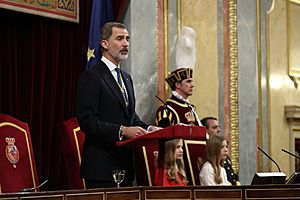
In May 2018, a court found the ruling party, the People's Party, guilty in some cases. The opposition, led by socialist Pedro Sánchez, called for a vote to remove the prime minister. The Parliament approved this on 1 June 2018. The King then appointed Sánchez as the new prime minister on 2 June. The socialist government lasted about a year and a half. It fell in February 2019 when it could not pass the budget.
The Socialists won the April 2019 general election. However, the political situation was still unclear. The socialist prime minister did not want to agree with other left-wing parties. So, the King dissolved Parliament. The November general election had a similar result. The prime minister then agreed to form a coalition government. Felipe swore in the new government on 13 January 2020.
COVID-19 Pandemic
On 18 March 2020, many people in Spain made noise from their balconies. This was during the COVID-19 pandemic. They wanted to protest. Despite this, Felipe VI's TV speech was seen by over 15 million people. This made it the most watched speech by a monarch in Spanish history. In July, he led a memorial for victims of the pandemic at the Royal Palace.
In December 2021, Felipe VI warned people not to be too relaxed about the virus. He said that "the risk has not disappeared."
King Felipe had to isolate himself several times between 2020 and 2022. This was because he tested positive for coronavirus. When he was isolated, Queen Letizia took his place at some events. However, she could not do activities related to his main constitutional duties.
2023 Spanish General Election and New Government
The government formed in 2020 was stable for almost its full term. However, in May 2023, local and regional elections were held. The results were not good for the government. The Socialist Party did okay, but other left-wing parties lost a lot of support. This caused the Socialists to lose power in many regions and cities.
After this bad result, the Socialist prime minister, Pedro Sánchez, asked the king to dissolve Parliament. He called for early elections. He wanted to find out what the Spanish people wanted for the country's future. The People's Party, led by Alberto Núñez Feijóo, won the election. However, they did not win enough seats to form a government on their own. This was seen as a win for Sánchez, who still had a chance to form a government.
The king met with political parties. Neither Sánchez nor Núñez Feijóo had enough support to form a government. So, on 22 August 2023, the king asked Núñez Feijóo to try to form a government. As expected, Núñez Feijóo could not get enough support. Parliament rejected his attempt. After more meetings in early October, the king nominated Pedro Sánchez. Sánchez got support from other parties. The Parliament re-elected Sánchez on 16 November 2023. The king swore in the new government on 21 November 2023.
On 3 November 2024, King Felipe, Queen Letizia, and Prime Minister Sánchez visited an area affected by floods. They were met by angry residents who threw mud and objects. Two bodyguards were injured. The Prime Minister had to leave, but the monarchs stayed to listen to the residents. The visit to other towns was postponed. The Royal Household said they would return soon. The king returned on November 12 to see the Armed Forces' efforts. On November 19, the monarchs finished the postponed visit.
Accession Anniversary
In 2024, Felipe celebrated his 10th anniversary as king. For this, he renewed his motto: "Service, commitment, and duty." The celebrations were kept simple, as is common during his reign.
The celebrations started at the Royal Palace. The royal family watched the Royal Guard change. After greeting citizens, the king gave the Order of Civil Merit to 19 regular citizens. These citizens were from different parts of Spain. The event ended with a lunch. During the lunch, the Princess of Asturias and Infanta Sofía surprised the king with a speech to congratulate him.
In the afternoon, the king's daughters visited the Royal Collections Gallery. They were with 40 young people who had won a contest called "What is a King to you?". The monarchs surprised everyone by attending this event, even though it was not planned. To end the celebrations, public concerts were held at the Royal Palace. There was also a light show on the palace's front. The royal family attended this.
After a year of celebrations across the country, the anniversary ended on 18 June 2025. Another concert was held in Madrid's Plaza Mayor. On 19 June 2025, the Royal Household announced that King Felipe had created his first nobility titles. Jaime Alfonsín, the king's former secretary, was made Marquess of Alfonsín. Former tennis player Rafael Nadal was made Marquess of Llevant de Mallorca. Swimmer Teresa Perales was made Marchioness of Perales. Singer Luz Casal was made Marchioness of Luz y Paz. Biochemist Carlos López Otín was made Marquess of Castillo de Leres. Photographer Cristina García Rodero was made Marchioness of Valle de Alcudia.
Sports
Felipe loves sports. He has attended many sports events since 1976. That year, he went with his father to a football match. When asked about his favorite team, he said Atlético de Madrid. He has been the club's honorary president since 2003. Besides football, he enjoys skiing, squash, and sailing.
As King of Spain, most sports have a tournament named after him, Copa del Rey (King's Cup). He usually attends these events and gives the trophy to the winner. Also, since the time of Alfonso XIII (1886–1931), the King supports sports federations. Most of them have the title "royal" given by the king. The latest to get this honor was the Spanish Rugby Federation in 2023.
He often attends international sports events where Spanish teams play. If he cannot go, another member of the royal family usually goes. For example, Leonor, Princess of Asturias and Infanta Sofía attended the UEFA Women's Euro 2022. Queen Letizia attended the 2023 FIFA Women's World Cup final.
International Agenda
Since becoming king on 19 June 2014, Felipe VI has visited 57 countries. He has made 129 official visits abroad. His first international trip was to the Vatican City in June 2014 to meet the Pope. His most recent was to Montevideo, Uruguay, in February–March 2025.
Most of his visits have been to European countries. He has also visited many American, Asian, and African countries. He has not visited any Oceanian country as king. As Prince of Asturias, he visited Australia and New Zealand in 1990.
Ibero-America
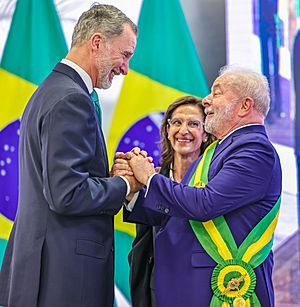
Like his father, Felipe VI has kept strong ties with countries in Latin America, Portugal, and Brazil. As King of Spain, he represents Spain at all the Ibero-American Summits. He often calls for "unity" in the region. He also wants to strengthen relations with Spain and the European Union. Spain is the main supporter of the Ibero-American General Secretariat. Felipe VI has attended all the summits since he became king. In 2021, he became the first Spanish monarch to visit Andorra.
He also continues the tradition of attending the inauguration of Latin American leaders. As of January 2024, he has attended over 80 presidential inaugurations.
Portugal
During Felipe VI's reign, good relations between Spain and Portugal have continued. After visiting the Vatican, Felipe's second foreign visit was to Portugal in July 2015. He met with President Aníbal Cavaco Silva and Prime Minister Pedro Passos Coelho. He said the relationship between the two countries was like "brother countries." He also said he wanted to keep the good relationship strong.
When Marcelo Rebelo de Sousa became the new president of Portugal, his first official visit abroad was to Spain in March 2016. The king and the Portuguese leader have a very good relationship. They are often seen together in each other's countries. For example, the Portuguese president visited Spain in 2020 to see the Prado Museum. They also had a private lunch together.
Cuba
From 11 to 14 November 2019, Felipe and Letizia made a state visit to Cuba. This was for the 500th anniversary of the city of Havana. This was the first state visit by a Spanish monarch in history. The visit was criticized by some.
The Spanish monarchs were welcomed by Cuban president Miguel Díaz-Canel. They signed agreements and walked through the streets of Havana. The next day, King Felipe honored Eusebio Leal, a Cuban historian.
To end the trip, the monarchs traveled to Santiago de Cuba. They visited the Castillo de San Pedro de la Roca. There, they honored those who died in past wars.
Mexico
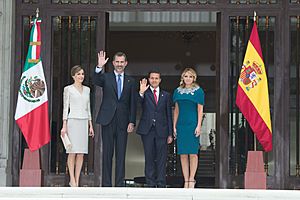
Felipe has had a good relationship with Mexico. This was especially true during the first years of his reign with president Enrique Peña Nieto. However, things changed when Andrés Manuel López Obrador became president in December 2018. The Mexican president expressed disapproval of Spain.
In early 2019, the Mexican president asked Felipe VI for an apology. This was for events that happened during the Spanish conquest of the Americas. The Royal Household did not respond directly. The Spanish government "firmly rejected" López Obrador's request. It encouraged both governments to "work together" to improve relations. The Mexican president has repeated his request for an apology several times.
After this, the Royal Family has not spoken about the issue. They have left it to the Spanish government to handle relations with Mexico.
In 2024, incoming Mexican president Claudia Sheinbaum officially banned Felipe VI from attending her inauguration on 1 October. She said this was because he did not respond to López Obrador's letter. In response, the Spanish government said it would not attend the event at all.
Gibraltar
As King of Spain, Felipe has supported Spain's historic claim over Gibraltar. In September 2014, he spoke at the United Nations General Assembly for the first time. He did not directly mention Gibraltar then.
Two years later, in another speech at the UN, the king called Gibraltar the "only existing colony in European territory." He asked the UK to end this situation. He wanted a solution that would benefit both countries and the people of Gibraltar.
The last time the King mentioned Gibraltar was during his state visit to the United Kingdom.
State Trip to the UK
From 12 to 14 July 2017, the King and Queen of Spain made a state visit to the United Kingdom. This visit had been postponed twice before.
On Wednesday, July 12, Charles, Prince of Wales, and Camilla, Duchess of Cornwall, welcomed the King and Queen. They then went to Horse Guards Parade. There, Queen Elizabeth II and Prince Philip, Duke of Edinburgh, officially welcomed them. Military honors were given. The King reviewed the Guard. Then, they went to Buckingham Palace. In the afternoon, Felipe went to the Parliament of the United Kingdom. He spoke there and met with the leader of the Labour opposition. In his speech, he mentioned Gibraltar. He said he was sure that both governments could find a solution that works for everyone. In the evening, Queen Elizabeth and Prince Philip hosted a State Dinner at Buckingham Palace.
On Thursday, July 13, there was a Spanish-British business meeting. The King and Queen attended. Later, they visited Westminster Abbey with Prince Harry. The King made an offering there. In the morning, they went to the Spanish Embassy in London. They met with Spanish people living in London. They also met with families of victims of recent events in London. Later, the King visited 10 Downing Street. He had a working lunch with Prime Minister Theresa May. They talked about issues important to both countries. Thursday ended with a gala dinner hosted by the Mayor of London.
On Friday, July 14, Elizabeth and Philip said goodbye to Felipe and Letizia at Buckingham Palace. Then, Felipe and Letizia visited the Francis Crick Institute. This is a large biomedical research center. Later, they went to Oxford. They visited the Weston Library and saw old manuscripts and books. Oxford University hosted a lunch for them. To finish, they met with professors and students at Exeter College who were connected to Spain.
Jewish Community
Felipe, like his father, has supported efforts to improve relations with the Jewish people. In 1990, he gave the Prince of Asturias Award to Sephardic Jewish communities.
In December 2015, the King held a special ceremony. This was to celebrate a new law. This law gave Spanish nationality to Sephardic Jews who were forced to leave Spain in 1492. In his speech, Felipe thanked the Sephardic Jews for keeping their language, Ladino. He also thanked them for teaching their children to love Spain. He welcomed them "back home," saying they had "returned home forever." Jewish groups thanked him, saying they were no longer "Spaniards without a homeland."
In January 2020, the King attended the Fifth World Holocaust Forum in Jerusalem. Felipe, who holds the title of King of Jerusalem, was the only international leader to speak at the opening dinner. He said that "there is no room for indifference in the face of racism, xenophobia, hatred and antisemitism." He also said that "forgetting the Holocaust would be extremely dangerous."
On 9 October 2023, King Felipe strongly condemned an attack on Israel. He called for efforts to "avoid greater suffering." He said Spain "remains faithful to its commitment to peace." Later that month, during the 2023 Princess of Asturias Awards ceremony, Felipe spoke about the ongoing conflict. He asked for unity to solve it. He remembered that in 1994, Israeli and Palestinian leaders received an award for their peace efforts. On 11 January 2024, the King met with diplomats in Spain. He called for the release of hostages. He also supported the idea of a Palestinian State next to Israel to stop the "cycle of violence."
Honours and Awards
In 2019, as King, Felipe received the World Peace & Liberty Award. This was from the World Jurist Association at the World Law Congress in Madrid.
Titles, Styles and Arms
Titles and Styles
Juan Carlos became King in November 1975. But Felipe did not get a special title as heir apparent until 1977. That year, he was made Prince of Asturias. This is the traditional title for the person who will inherit the Spanish throne. The royal order also allowed him to use "the other historical titles corresponding to the heir of the Crown." Felipe started using the title of Prince of Girona publicly in 1990. He was the first Bourbon to use this title.
When he became king, Felipe took on the same titles his father had. If the old Kingdoms of Aragon and Navarre had separate naming styles, he would also be known as Felipe V of Aragon and Felipe VIII of Navarre.
Arms
As the heir to the Spanish throne, Felipe's coat of arms was the Spanish coat of arms with a blue stripe. The shield shows symbols for different parts of Spain: Castile, León, Aragon, Navarre, and Granada. In the middle, there were the arms of the Bourbon family. Around the shield was the collar of the Order of the Golden Fleece. Above it was the crown of the heir to the throne.
When he became king, the blue stripe was removed from his arms. The crown changed to the monarch's crown. These arms are different from his father's as king. They do not include some older symbols.
See also
 In Spanish: Felipe VI de España para niños
In Spanish: Felipe VI de España para niños
- History of Spain
- Politics of Spain
- Line of succession to the Spanish throne
- List of honours of the Spanish royal family by country
- List of state visits received by Felipe VI
- List of titles and honors of the Spanish Crown
- Princess of Asturias Awards
 | James Van Der Zee |
 | Alma Thomas |
 | Ellis Wilson |
 | Margaret Taylor-Burroughs |


